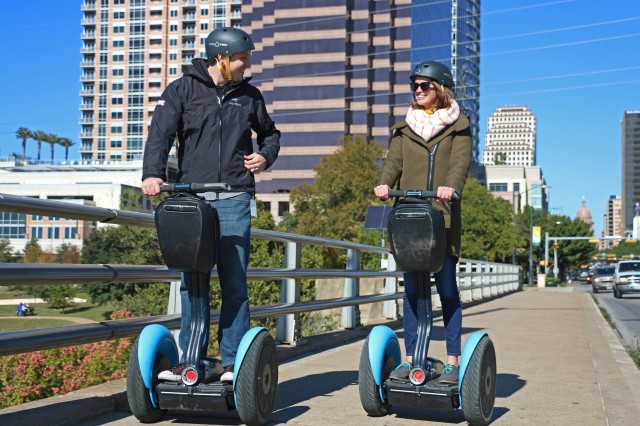Perks Grow as Austin Startups Vie for Talented Workers

Claire Nokes and Jonathan McDaniel ride company segways over the South Congress bridge in downtown Austin. RetailMeNot, a digital coupon company where the two currently work, lends employees Segways as a “perk” for their employment with the company. Photo By Thalia Juarez/Reporting Texas
By Rachel Phua
For Reporting Texas
John Pafk, a 36-year-old marketing manager for an Austin information technology company, doesn’t worry about breakfast on weekdays.
“It’s nice when you have to wake up at 6 a.m., drop your kids off at school, and you have an array of breakfast choices waiting for you at work,” he said.
His employer is Spiceworks, which runs an online community and marketplace for IT professionals. Breakfast is just one of the perks he gets from the company.
Spiceworks caters lunch on most days and offers its 325 employees discounted gym memberships and in-office workouts. There are cell phone bill reimbursements, plus dry cleaning pickup services and made-to-order drinks at the office coffee station. In the summer, the company holds a field day with mascots, disc jockeys and beer.
Spiceworks is hardly the lone purveyor of perks in town. The 900 startups in Austin’s booming tech sector, which contributes $21 billion to the local economy each year, according to the Austin Technology Council, are similarly eager to retain skilled workers. Corporate recruiters work overtime to offer perks—everything from the mundane to the outlandish—they hope will dissuade workers from jumping ship.
RetailMeNot, a digital coupon company, lends employees company-owned Segways to get around downtown Austin, said Annette Alexander, vice president of human resources. The company is publicly listed and has a market capitalization of about $760 million. It has 530 employees worldwide, with 350 at its Austin headquarters. There, once a quarter, selected staff members spin a giant wheel in hopes of winning prizes that include having RetailMeNot pay a month’s rent, airfare for two to anywhere in the U.S., or a two-minute, grab-all-you-can shopping spree.
Clarify, an audio and video technology search company, allows employees to decide for themselves how much vacation to take. “Netflix was the first company to implement it, I think,” said Ivo Rothschild, Clarify’s cofounder. “We want people to have a work-life balance, and we know they are responsible employees.”
The perks race is serious business across the country. Facebook and Apple stirred up news coverage in September when the Silicon Valley giants offered female employees a new benefit: up to $20,000 to freeze their eggs so they could focus on their jobs, with the confidence they could have children later, even past their prime fertility years.
Austin’s tech industry provides 9 percent of its total employment, or more than 100,000 jobs, and the technoscenti worry that the lack of qualified workers could put a crimp in future growth.
According to the Austin Technology Council study, 45 percent of CEOs who were surveyed said they had difficulty filling key technical roles because of competition from other companies.
In the same survey, 57 percent of CEOs said there weren’t enough quality applicants for tech job openings. And 28 percent said those who did apply often lacked necessary experience.
Those involved in the perks race wonder whether freebies are sufficient to attract enough talent. Jennifer Cantu, director of talent and culture at Spiceworks, says that the hiring process is “definitely hard,” especially with the need to attract individuals with specific skills.
Certain types of talent might not exist in great numbers. “We might be looking for a Web developer experienced with Ruby on Rails that is harder to find among college students,” said Cantu, referring to one system developers use.
Then comes location, location, location. Austin may have a harder time attracting talent because cities on the East and West coasts seem more attractive, said Dennis Passovoy, the Sam Walton Fellow in Free Enterprise at the University of Texas McCombs School of Business.
“The two coasts and the bigger cities are likely to pay higher salaries for a given job than Austin will, given our relative cost of living,” said Passovoy, “and from an attraction perspective, it might not be as obvious to a skilled worker that a lower salary buys just as much here as a higher one will in Northern California.”
Some observers see the focus on perks as misplaced. “The experienced workers don’t care about these benefits. What they want are challenges and value to their work,” said independent startup adviser Paul O’Brien, adding such workers see themselves deriving benefit from the company’s success instead of corporate gimmicks.
Austin does have its advantages. Emanuel Ibarra, director of global technology and innovation at the Greater Austin Chamber of Commerce, points to feedback from entrepreneurs who moved their companies to the area.
“In Silicon Valley, it’s a dog-eat-dog world,” Ibarra said, and some workers in Austin prefer a more “collaborative culture.” I don’t think it’s stress. Just relationship-wise, it’s more comfortable to work in Austin.”
While companies have difficulty hiring experienced workers, young talent is much easier to find, Ibarra adds.
“There are 402,000 students living in a 100-mile radius of Austin,” he said. “San Antonio, San Marcos, College Station and UT. That’s a large pool.”
Companies also should invest in nurturing their workers instead of focusing so much on perks, said John Butler, director of the Herb Kelleher Center for Entrepreneurship at UT.
“Great companies like Google and Microsoft have the best workers, and they train their workers,” Butler said.
Meanwhile, there’s a dark side to competition to offer amenities such as free meals, personal services and Friday afternoon happy hours.
“The reason why these companies create such a cozy atmosphere is because they don’t want their employees to go home,” said Kristie Loescher, senior lecturer at McCombs.